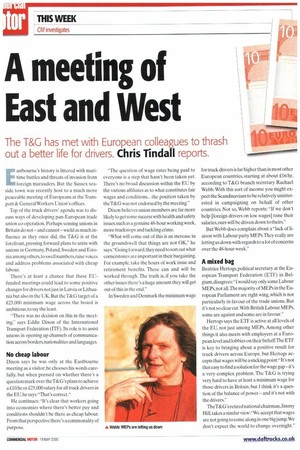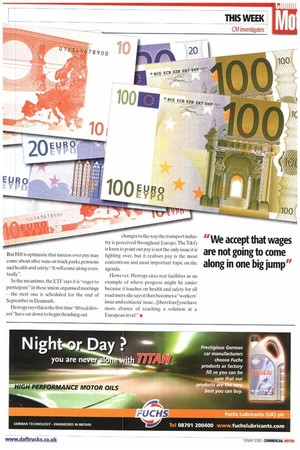A meeting of
Page 26

Page 27

If you've noticed an error in this article please click here to report it so we can fix it.
East and West ial
The T&G has met with European colleagues to thrash out a better life for drivers. Chris Tindall reports.
Eastboume's history is littered with maritime battles and threats of invasion from foreign marauders. But the Sussex seaside town was recently host to a much more peaceable meeting of Europeans at the Transport & General Workers Union's offices.
Top of the truck drivers' agenda was to discuss ways of developing pan-European trade union co-operation. Perhaps sensing unions in Britain do not — and cannot — wield as much influence as they once did, the T&G is at the forefront, pressing forward plans to unite with unions in Germany, Poland, Sweden and Estonia among others,to swell numbers, raise voices and address problems associated with cheap labour.
There's at least a chance that these EUfunded meetings could lead to some positive changes for drivers not just in Latvia or Lithuania but also in the UK. But the T&G target of a £25,000 minimum wage across the board is ambitious, to say the least.
"There was no decision on this in the meeting," says Eddie Dixon of the International Transport Federation (ITF). Its role is to assist unions in opening up channels of communication across borders, nationalities and languages.
No cheap labour Dixon says he was only at the Eastbourne meeting as a visitor; he chooses his words carefully, but when pressed on whether there's a question mark over the T&G's plans to achieve a £10/hr or£25.000 salary for all truck drivers in the EU, he says: -That's correct."
He continues: "It's clear that workers going into economies where there's better pay and conditions shouldn't be there as cheap labour. From that perspective there's a commonality of purpose. "The question of wage rates being paid to everyone is a step that hasn't been taken yet. There's no broad discussion within the EU by the various affiliates as to what constitutes fair wages and conditions.., the position taken by the T&G was not endorsed by the meeting."
Dixon believes union members are far more likely to get some success with health and safety issues,such as a genuine 48-hour working week, more truckstops and tackling crime.
"What will come out of this is an increase in the groundswell that things are not OK," he says."Going forward, they need to sort out what cornerstones are important in their bargaining. For example, take the hours of work issue and retirement benefits. These can and will be worked through. The truth is, if you take the other issues there's a huge amount they will get out of this in the end."
In Sweden and Denmark the minimum wage for truck drivers is far higher than in most other European countries, starting at about £16/hr, according to T&G branch secretary Rachael Webb. With this sort of income you might expect the Scandinavians to be relatively uninterested in campaigning on behalf of other countries. Not so, Webb reports: -If we don't help [foreign drivers on low wages] raise their salaries, ours will be driven down to theirs."
But Webb does complain about a "lack of liaison with Labour party MEPs. They really are letting us down with regards to a lot of concerns over the 48-hour week."
A mixed bag Beatrice Hertogs, political secretary at the European Transport Federation (ETF) in Belgium,disagrees:" I would say only some Labour MEPs,not all. The majority of MEPs in the European Parliament are right wing, which is not particularly in favour of the trade unions. But it's not so clear cut. With British Labour MEPs, some are against and some are in favour."
Hertogs says the ETF is active at all levels of the EU, not just among MEPs. Among other things it also meets with employers at a European level and lobbies on their behalf.The ETF is key to bringing about a positive result for truck drivers across Europe, but Hertogs accepts that wages will be a sticking point:"It's not that easy to find a solution for the wage gap—it's a very complex problem. The T&G is trying very hard to have at least a minimum wage for those drivers in Britain, but I think its a question of the balance of power — and it's not with the drivers."
The T&G's retired national chairman, Jimmy HiLtakes a similar view:"We accept that wages are not going to come along in one big j ump.We don't expect the world to change overnight." But Hill is optimistic that success over pay may come about after wins on truck parks, pensions and health and safety: "It will come along eventually".
In the meantime, the ETF says it is "eager to participate" in these union organised meetings — the next one is scheduled for the end of September in Denmark.
Hertogs says this is the first time "80 real drivers" have sat down to begin thrashing out changes to the way the transport industry is perceived throughout Europe. The T&G is keen to point out pay is not the only issue it is fighting over, but it realises pay is the most contentious and most important topic on the agenda.
However, Hertogs cites rest facilities as an example of where progress might be easier because it touches on health and safety for all road users:she says it then becomes a "workers' issue and a citizens' issue... [therefore] you have more chance of reaching a solution at a European level." •














































































































































































































